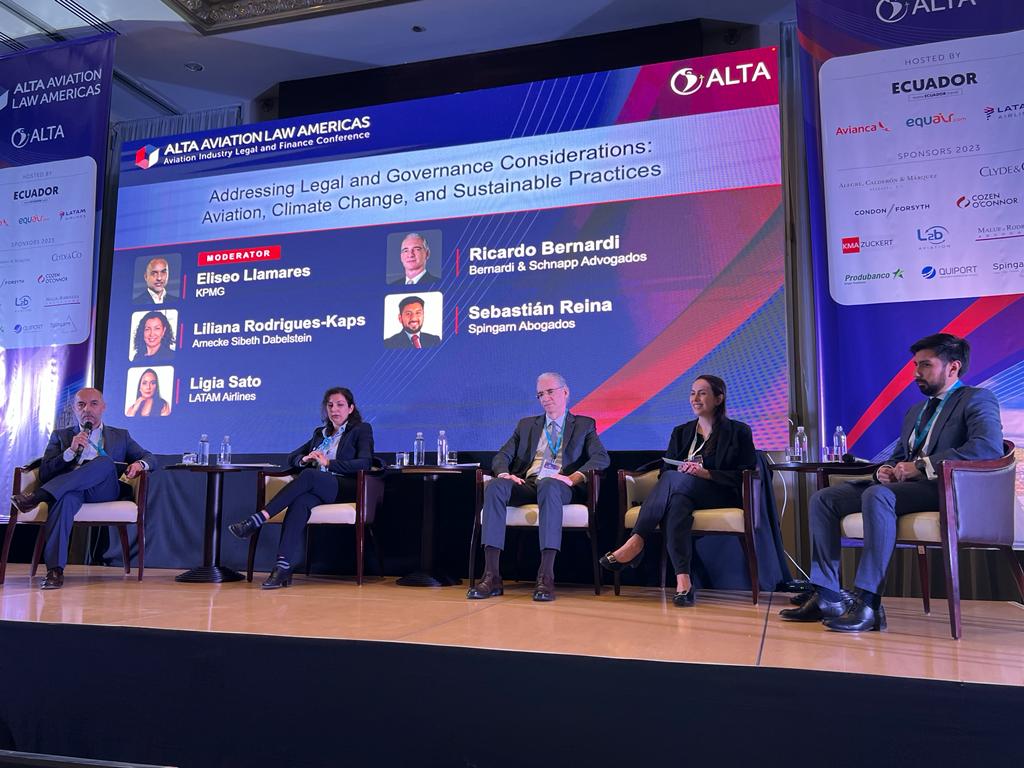Sustainable Aviation Route in Latin America and the Caribbean
The ALTA Aviation Law Americas Conference featured a discussion on the status of decarbonization in Latin America and the Caribbean
September 22, 2023

Quito, September 22, 2023 - The aviation industry plays an important social role in connecting people, transporting essential inputs quickly and safely, and providing socioeconomic opportunities through an extensive value chain. However, this activity comes at an environmental cost. Therefore, the panel "Addressing Legal and Governance Considerations in Aviation for Climate Change and Sustainability," included as part of the academic agenda of ALTA Aviation Law Americas 2023, discussed the issue in depth. Existing advances in Brazil and Ecuador deserve special attention.
When it comes to effective sustainability actions, LATAM Airlines is at the forefront. Ligia Sato, Sustainability Manager of LATAM Brazil, commented that there are no simple solutions to complex problems and decarbonization is a complex process. "We are experiencing a climate emergency and we must make the transition rapidly. We cannot wait. For aviation there is not only an operating impact, such as increased rain and hot weather, but there is also a demand from customers encouraging us to be more sustainable. We need to think about new technologies, clear and consistent public policies listening to all stakeholders," she said.
For decarbonization to be achieved, public-private collaboration is a priority. Ligia highlighted the strategic role of airlines in promoting public policies through the exchange of expertise.
A further issue shared by the panel was that the region has its own reality and each country faces specific challenges and possibilities. Therefore, measures cannot be forced; they must be adjustable to local circumstances and respond to market capabilities.
Panelist Sebastián Reina, Director of Spingarn Abogados in Ecuador, stated that "it is important to develop a regional regulatory scheme applicable in each country", emphasizing that a small country such as Ecuador may not be compared to Brazil.
Ricardo Bernardi, partner at Bernardi & Schnapp Advogados, stressed that it is essential to implement flexible and adaptable approaches that lead to compliance with environmental commitments, taking into account the nuances of each nation. "Brazil has everything to produce raw material for SAF as established by CORSIA, but we face challenges, including: reducing the cost of credit to attract investments, having tax incentives for new economic activity and, mainly, legal security. More than liabilities, a voluntary market is essential, since a liability would substantially increase costs in an industry with very low margins that impact the consumer and hamper the growth of the sector.
The panel moderator, Eliseo Llamazares, partner, Head of Aviation and Tourism of KPMG for Latam, explained that the United States and Europe concentrate the most investments in the production of SAF (thanks to their incentives and legal security). "Latin America is lagging behind with some investments in Brazil and primarily in Paraguay, but we have great opportunities in the short-term with most available biomass. Long-term investment through SAF, whose impact does not directly affect food chains or deforestation risks, should not be forgotten."
Consistent, collaborative and market development measures may speed up the arrival of investment in the region and thus make the implementation of eco-friendly initiatives throughout the region more accessible, ensuring that aviation in LAC effectively contributes to mitigating carbon emissions.
Ligia stressed that "we must keep in mind that we require a sustainable aviation, but also an affordable one. Fuel represents 30% of an airline's operating costs and SAF is up to five times more expensive, which may make aviation unaffordable."
Summarizing, collaboration between the public and private sectors, encouraging investment for the production of raw materials and SAF, as well as establishing clear and comprehensive regulatory frameworks to promote sustainable practices in the aviation industry are the priority.
Through joint efforts, we will build a more sustainable future for aviation in Latin America and the Caribbean without restricting the democratization of access to air transport.


